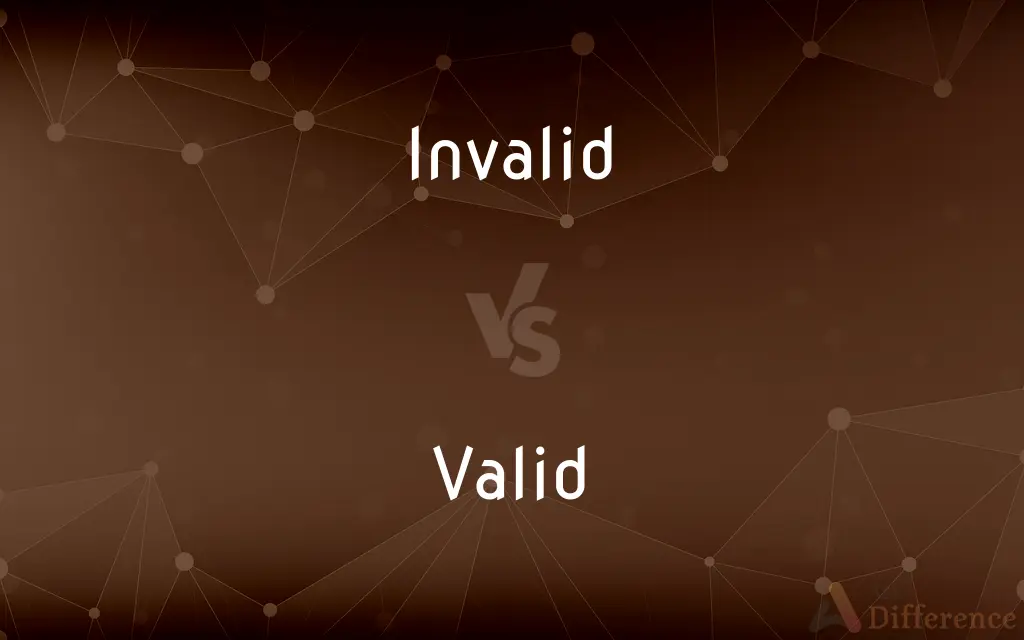Invalid vs. Valid — What's the Difference?
Edited by Tayyaba Rehman — By Fiza Rafique — Updated on April 15, 2024
Invalid means not acceptable or incorrect based on laws or rules, focusing on a lack of proper foundation, while valid refers to something that is logically or legally sound, upheld by facts or regulations.

Difference Between Invalid and Valid
Table of Contents
ADVERTISEMENT
Key Differences
Invalid typically denotes something that lacks legal force, correctness, or acceptability, suggesting it is not based on sound reasoning, evidence, or legal standing. On the other hand, valid implies that an argument, document, or procedure adheres to established rules, principles, or laws, thereby possessing rightful authenticity or effectiveness.
In the context of reasoning or arguments, an invalid argument fails to follow logical structures, which means its conclusion does not necessarily follow from its premises. Whereas a valid argument, regardless of the truth of its premises, is one where the conclusion logically follows from the premises.
In legal terms, an invalid document, such as a contract, lacks one or more necessary elements that are required for legal enforceability, such as consent or proper authority. Conversely, a valid contract meets all the legal requirements, including agreement, consideration, and capacity, making it enforceable in a court of law.
When referring to data or experiments, invalid results typically stem from methodological errors, compromised data integrity, or failure to follow proper scientific procedures. In contrast, valid results are those obtained through rigorously controlled processes, ensuring reliability and accuracy of the findings.
In everyday usage, invalid might refer to ideas or claims that are unsupported or debunked, often implying a disconnection from factual accuracy or practical applicability. Valid, however, typically refers to claims or ideas that are supported by facts or evidence, ensuring their credibility and applicability in practical scenarios.
ADVERTISEMENT
Comparison Chart
Definition
Lacking correctness or legal acceptability.
Logically or legally sound.
Focus
Error, incorrectness, or legal insufficiency.
Conformance to rules, logic, or regulations.
Examples in Usage
Invalid argument, invalid ticket.
Valid point, valid passport.
Key Characteristics
Unsound, based on faulty reasoning or data.
Sound, grounded in correct procedures or laws.
Outcome
Generally leads to rejection or disqualification.
Generally leads to acceptance or confirmation.
Compare with Definitions
Invalid
Not acceptable according to law or rule.
He was stopped at the border because his visa was invalid.
Valid
Well-founded and applicable, backed by law or logic.
His argument was valid, based on firmly established facts.
Invalid
Logically flawed or unsound.
The conclusion she drew was invalid because it did not follow from her premises.
Valid
Holding water in terms of argument or theory.
Her hypothesis was valid as it was supported by the experimental data.
Invalid
Not properly constructed or reasoned.
The theory was proved invalid after new evidence contradicted it.
Valid
Up-to-date and operational in a technical context.
Make sure your software license is valid to receive updates.
Invalid
Technologically not functioning or expired.
The software rejected the serial number as invalid.
Valid
Medically sound or in good health.
After his recovery, he was declared valid to return to work.
Invalid
Medically or physically incapacitated (often considered an outdated and insensitive term).
Older texts may refer to a person as an invalid if they are chronically ill.
Valid
Legally or officially acceptable.
You will need a valid ID to enter the government building.
Invalid
Incapacitated by illness or injury.
Valid
Well grounded; just
A valid objection.
Invalid
One who is incapacitated by a chronic illness or disability.
Valid
Producing the desired results; efficacious
Valid methods.
Invalid
Of, relating to, or intended for invalids.
Valid
Having legal force; effective or binding
A valid title.
Invalid
Not legally or factually valid; null
An invalid license.
Valid
Containing premises from which the conclusion may logically be derived
A valid argument.
Invalid
Falsely based or reasoned; faulty
An invalid argument.
Valid
Correctly inferred or deduced from a premise
A valid conclusion.
Invalid
To incapacitate physically.
Valid
(Archaic) Of sound health; robust.
Invalid
Chiefly British To release or exempt from duty because of ill health
"I was not quite sick enough to be invalided out, even though I was of no more use" (Mary Lee Settle).
Valid
Well grounded or justifiable, pertinent.
I will believe him as soon as he offers a valid answer.
Invalid
Not valid; not true, correct, acceptable or appropriate.
Your argument is invalid because it uses circular reasoning.
This invalid contract cannot be legally enforced.
Valid
Acceptable, proper or correct; in accordance with the rules.
A valid format for the date is DD/MM/YY.
Do not drive without a valid license.
Invalid
Suffering from disability or illness.
Valid
Related to the current topic, or presented within context, relevant.
Invalid
Intended for use by an invalid.
Valid
(logic) Of a formula or system: such that it evaluates to true regardless of the input values.
Invalid
Any person with a disability or illness.
Valid
(logic) Of an argument: whose conclusion is always true whenever its premises are true.
An argument is valid if and only if the set consisting of both (1) all of its premises and (2) the contradictory of its conclusion is inconsistent.
Invalid
A person who is confined to home or bed because of illness, disability or injury; one who is too sick or weak to care for themselves.
Valid
Genuine - as distinguished from efficient or regular - sacrament.
Invalid
(archaic) A disabled member of the armed forces; one unfit for active duty due to injury.
Valid
Strong; powerful; efficient.
Invalid
To exempt from (often military) duty because of injury or ill health.
He was invalided home after the car crash.
Valid
Having sufficient strength or force; founded in truth; capable of being justified, defended, or supported; not weak or defective; sound; good; efficacious; as, a valid argument; a valid objection.
An answer that is open to no valid exception.
Invalid
(transitive) To make invalid or affect with disease.
Valid
Having legal strength or force; executed with the proper formalities; incapable of being rightfully overthrown or set aside; as, a valid deed; a valid covenant; a valid instrument of any kind; a valid claim or title; a valid marriage.
Invalid
Of no force, weight, or cogency; not valid; weak.
Valid
Well grounded in logic or truth or having legal force;
A valid inference
A valid argument
A valid contract
A valid license
Invalid
Having no force, effect, or efficacy; void; null; as, an invalid contract or agreement.
Valid
Still legally acceptable;
The license is still valid
Invalid
Not well; feeble; infirm; sickly; as, he had an invalid daughter.
Invalid
A person who is weak and infirm; one who is disabled for active service; especially, one in chronic ill health who is unable to care for himself.
Invalid
To make or render invalid or infirm.
Invalid
To classify or enroll as an invalid.
Peace coming, he was invalided on half pay.
Invalid
Someone who is incapacitated by a chronic illness or injury
Invalid
Force to retire, remove from active duty, as of firemen
Invalid
Injure permanently;
He was disabled in a car accident
Invalid
Having no cogency or legal force;
Invalid reasoning
An invalid driver's license
Invalid
No longer valid;
The license is invalid
Common Curiosities
What makes an argument invalid?
An argument is invalid if the conclusion does not logically follow from its premises.
How can a document be declared invalid?
A document can be declared invalid if it lacks necessary legal elements like consent, proper authority, or adherence to statutory requirements.
What are the implications of using invalid data?
Using invalid data can lead to incorrect conclusions, affecting the credibility and effectiveness of research or decisions.
Can an idea be both invalid and popular?
Yes, an idea can be popular yet invalid if it lacks factual or logical support but is widely accepted or believed.
What distinguishes a valid argument from a true argument?
A valid argument correctly follows logical rules where the conclusion necessarily follows from the premises, whereas a true argument has premises that are factually correct.
How is validity determined in a legal context?
Validity in a legal context is determined by conformity to legal standards and principles, such as contracts having all essential elements like agreement, consideration, and legal purpose.
Can a theory become invalid over time?
Yes, a theory can become invalid if new evidence or understanding contradicts or disproves it.
How do scientific methods ensure the validity of results?
Scientific methods ensure validity through controlled, replicable procedures and rigorous peer review to eliminate biases and errors.
Why is it important for a medical diagnosis to be valid?
A valid medical diagnosis is crucial for appropriate treatment and management of a condition, affecting patient care and outcomes.
How can one verify the validity of information online?
Verifying information involves checking multiple reputable sources, considering evidence supporting the claims, and assessing the credibility of the sources.
How do validity and legality interact?
Legality refers to conformity with the law, while validity involves broader correctness or soundness, often including but not limited to legal aspects.
What role does validity play in academic research?
Validity is crucial in academic research as it underpins the reliability and generalizability of the findings.
What is necessary for a claim to be considered valid?
A claim must be supported by evidence or logically coherent reasoning to be considered valid.
What are common signs of an invalid argument in debates?
Common signs include logical fallacies, inconsistencies, or reliance on incorrect or irrelevant information.
What are the consequences of invalid legal documents?
Invalid legal documents can lead to legal disputes, nullification of agreements, or lack of enforceability.
Share Your Discovery

Previous Comparison
Camp vs. Encampment
Next Comparison
Charm vs. CharismaAuthor Spotlight
Written by
Fiza RafiqueFiza Rafique is a skilled content writer at AskDifference.com, where she meticulously refines and enhances written pieces. Drawing from her vast editorial expertise, Fiza ensures clarity, accuracy, and precision in every article. Passionate about language, she continually seeks to elevate the quality of content for readers worldwide.
Edited by
Tayyaba RehmanTayyaba Rehman is a distinguished writer, currently serving as a primary contributor to askdifference.com. As a researcher in semantics and etymology, Tayyaba's passion for the complexity of languages and their distinctions has found a perfect home on the platform. Tayyaba delves into the intricacies of language, distinguishing between commonly confused words and phrases, thereby providing clarity for readers worldwide.
















































